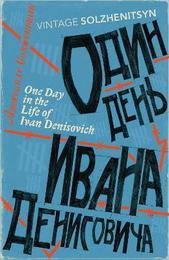
|
One Day in the Life of Ivan Denisovich
Paperback / softback
Main Details
| Title |
One Day in the Life of Ivan Denisovich
|
| Authors and Contributors |
By (author) Aleksandr Solzhenitsyn
|
|
Translated by Harry Willetts
|
| Physical Properties |
| Format:Paperback / softback | | Pages:176 | | Dimensions(mm): Height 198,Width 129 |
|
| Category/Genre | Modern and contemporary fiction (post c 1945) |
|---|
| ISBN/Barcode |
9780099449270
|
| Classifications | Dewey:891.7344 |
|---|
| Audience | |
|---|
|
Publishing Details |
| Publisher |
Vintage Publishing
|
| Imprint |
Vintage Classics
|
| Publication Date |
1 January 1996 |
| Publication Country |
United Kingdom
|
Description
The Gulag, the Stalinist labour camps to which millions of Russians were condemned for political deviation, has become a household word in the West. This is due to the accounts of many witnesses, but most of all to the publication, in 1962, of One Day in the Life of Ivan Denisovich, the novel that first brought Aleksandr Sozhenitsyn to public attention. His story of one typical day in a labour camp as experienced by prisoner Ivan Denisovich Shukhov is sufficient to describe the entire world of the Soviet camps. The original text was first published in the Soviet journal Novy Mir, during the Khrushchev 'thaw'. However, in the rush to bring out the first translation, the novel was significantly diminished. The idiosyncratic language of the protagonist - a man of peasant origins and no formal education - the colloquialisms and prison-camp slang were inadequately rendered; dense, elliptical syntax was smoothed over; earthy dialogue vanished into euphemism. Moreover, the novel, published in the Soviet Union for avowedly political reasons, was received abroad almost exclusively as a political sensation. With this new translation, however, the full measure of the work's artistic achievement can finally be gauged.
Author Biography
Aleksandr Solzhenitsyn was born in 1918 and grew up in Rostov-on-Don. He graduated in physics and mathematics from Rostov University and studied literature by correspondence course at Moscow University. In World War II he fought as an artillery officer, attaining the rank of captain. In 1945, however, after making derogatory remarks about Stalin in a letter, he was arrested and summarily sentenced to eight years in forced labour camps, followed by internal exile. In 1957 he formally rehabilitated, and settled down to teaching and writing. The publication of One Day in the Life of Ivan Denisovich in Novy Mir in 1962 was followed by publication, in the West, of his novels Cancer Ward and The First Circle. In 1970 he was awarded the Nobel Prize for Literature, and in 1974 his citizenship was revoked and he was expelled from the Soviet Union. He settled in Vermont and worked on his great historical cycle The Red Wheel. In 1990, with the fall of Soviet Communism, his citizenship was restored and four years later he returned to settle in Russia. H. T. Willetts' translations from the Russian include Alexander Solzhenitsyn's The Gulag Archipelago (with T. P. Whitney) and The Oak and The Calf.
ReviewsA masterpiece in the great Russian tradition. There have been many literary sensations since Stalin died. Doctor Zhivago apart, few of them can stand up in their own right as works of art. Ivan Denisovich is different * New Statesman * For much of the century that he came to dominate, he was simply Russia's greatest writer * Guardian * Solzhenitsyn's little book on the Soviet camps, One Day In The Life Of Ivan Denisovich, has just been reissued, in a much-improved translation by Harry Willetts. It remains a devastating book - a classical tragedy... Solzhenitsyn is a genius and a hero: Ivan Denisovich stands with Animal Farm. * Guardian *
|